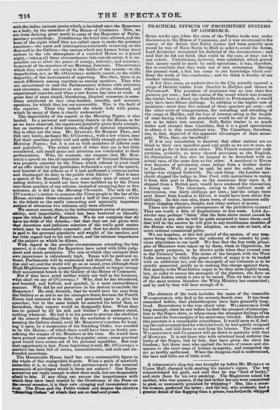PRACTICAL EFFECTS OF PROHIBITORY SYSTEMS OF COMMERCE.
SOME weeks ago,'when the state of the Timber trade was under discussion in the House of Commons, and it was mentioned in the course of the debate that Baltic timber had been actually sent round by way of Nova Scotia to Hull in order to avoid the duties, Lord ALTHORP insinuated his disbelief of the circumstance; and said that he did not think that could be the case, at least not to any extent. Calculations, however, were exhibited, which proved that money could be made by such operations; it was, therefore, fair to conclude that they were not of rare occurrence. During the present week, a fact has come to our knowledge which con- firms the truth of this conclusion ; and we think it worthy of our - readers' attention.
A few days since, an underwriter in the City actually insured a cargo of Dantzie timber from Dantzic to Halifax and thence to Portsmouth. The premium of insurance was no less than five guineas per cent.; had the course of the vessel which was to carry the timber been a direct one from Dantaic to Portsmouth, it would only have been fifteen shillings. In addition to the higher rate of "
premium—more than five instead of three quarters per cent.—all the other costs of transportation, the unloading and reloading of the cargo at Halifax, and the loss of interest owing to the length of time during which the purchaser would be out of his money, are to be taken into account. Still, Baltic timber is so much better and cheaper than Canadian, that it is a good speculation. to obtain it in this roundabout way. The Canadians, therefore, are, in fact, deprived of the apparent advantages of their mono- poly. Who, then, are benefited?
If it is any consolation to discover that other nations are as blind to their own manifest good and profit as we are to ours, we need not go far to find such solace. The French commercial code contains, probably, as many absurd provisions as the English. In illustration of this also we happen to be furnished with an actual case, of the same date as the other. A merchant in Havre was desirous of purchasing seine indigo from a brother dealer in London. Well, it may be said, he sent the order, and the indigo was shipped fbrthwith. No such thing : the London mer- chant shipped the indigo to New York, with instructions to reship it from that port to Havre, as the enormous duty upon it, if shipped from a British port, would have rendered the transaction a losing one. The insurance, owing to the indirect mode of conveyance, was thirty shillings per cent.; had the indigo been sent direct from London to Havre, it would have been about five shillings. In this case also, there were, of course, immense addi- tional shipping, charges, freight, ann other outlays of money.
These are the glorious consequences of the prohibitive system! They are worth a folio of disquisitions on free trade. Lord Az,- THORP may perhaps "think" that the facts above stated cannot be true, and at any rate he will be quite surprised to learn them; and that will be the answer he will give to any troublesome member or the House who may urge the adoption, on our side at least, of a more rational commercial policy.
We are hopeless, at this late period of the session, of any mea- sures being taken to relieve the industry of the country by judi- cious alterations in our tariff. We fear that the free trade princi- ples of Ministers were taken up by them, when in Opposition, for mere party purposes, to be thrown aside when they crossed over to the Treasury bench. The terms of the bargain with the West India interest, by which the great article of sugar is to be loaded with an additional tax, and the monopoly of our Colonists is to be- strictly preserved, justify us in making this charge against them. Not merely is the West Indian sugar to be thus more highly taxed, but, in order to secure the monopoly of the planters, the duty on the East Indian article is also to be raised. This we take to be one of the most serious blunders the Whig Ministry has committed; and by and by they will hear enough of it.


















 Previous page
Previous page